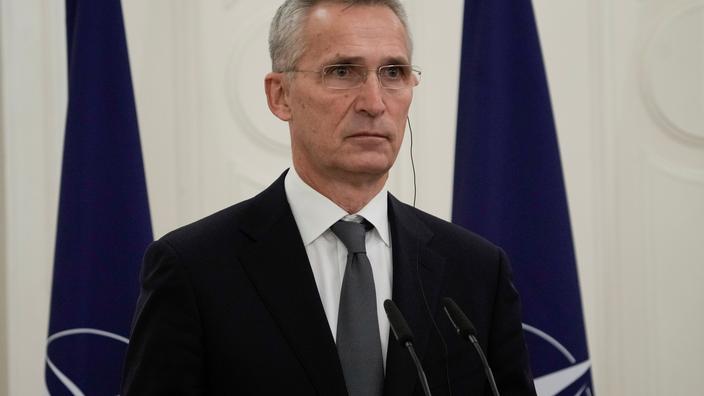NATO foreign ministers meet on Tuesday, November 30 in Riga to discuss how to respond to the strengthening of the Russian military presence on the border with Ukraine, as fears grow over a possible aggression against it. country.
Long-planned, the two-day meeting comes at a time of instability on NATO's eastern flank, especially since the allies must also address the migration crisis orchestrated by Belarus, an ally of the Kremlin.
Read also According to Kiev and Washington, Russia could attack Ukraine this winter
The West, including the United States, fears that Russia could invade Ukraine, and accuses the Kremlin of gathering forces on the border with that country.
"Russian intentions are unclear but there is an unusual concentration of forces for the second time this year,"
NATO Secretary General Jens Stoltenberg told AFP during a visit to the forces of the United Nations. 'Alliance in Latvia.
"We are seeing heavy armored vehicles, drones, electronic warfare systems and tens of thousands of combat-ready soldiers
," he said.
Moscow, which invaded Ukrainian Crimea in 2014 and supports separatists fighting Kiev, has firmly denied that it is planning an attack and in turn accuses NATO of stoking tensions.
NATO diplomats remain uncertain about Russian President Vladimir Putin's intentions, but ministers will discuss contingency plans in the event of a possible invasion.
The US-led alliance intends to walk a fine line: it wants to show the Kremlin that it would face high costs if it used force against Ukraine, while avoiding provoking it.
It's about finding the right signals and the right posture of deterrence that actually leads to de-escalation rather than escalation.
"
A senior American official
Officials expect talks on further support for the Ukrainian military and a potential strengthening of NATO forces deployed along its eastern flank. They stress, however, that Ukraine, aspiring to NATO and which will have its Minister of Foreign Affairs in Riga, is not protected by the alliance's collective defense pact.
"We do not want to leave any doubt in the minds of the people that there will be serious consequences, strategic consequences for Russia if it pursues the path that we fear it may take,"
said a senior US official. .
“It's about finding the right signals and the right deterrent posture that actually leads to de-escalation rather than
to an escalation, ” he added.
US President Joe Biden said on Friday he was likely to hold talks with Russian or Ukrainian leaders to prevent rising tensions. The growing angst around Ukraine comes as NATO members Poland, Lithuania and Latvia face another threat from the east. The three countries accuse Moscow's ally, Belarus, of orchestrating the migration crisis and thus placing a
“hybrid”
threat on the European Union
, in response to European sanctions, which Minsk denies. NATO has expressed its
"solidarity"
with its members in the East, but has kept well on the sidelines, considering the level of the threat caused by the migration crisis below that ofpossible active aggression.
Read alsoRussia will have to "pay the price" for aggression against Ukraine, warns NATO
Polish President Andrzej Duda spoke of the increase in the number of NATO forces deployed on its eastern flank during a meeting with Stoltenberg last week.
But a decision to trigger emergency consultations under Article 4 of the alliance appears to have been on hold for now.
Speaking on a joint tour of the Baltic states on Sunday, Jens Stoltenberg and EU chief Ursula von der Leyen pledged to step up cooperation in the face of such challenges.
Tensions along NATO's eastern borders and the EU have eased since some migrants have started returning home to Iraq, but Warsaw and Vilnius insist the crisis is far from over.
"There is no doubt that the Lukashenko regime and the forces that support it will continue to test the unity of the Western world and its capacity to react,"
Lithuanian President Gitanas Nauseda said.







/cloudfront-eu-central-1.images.arcpublishing.com/prisa/OVEHXAIEY2CNUR3I7QIQKPVZ5A.jpg)

